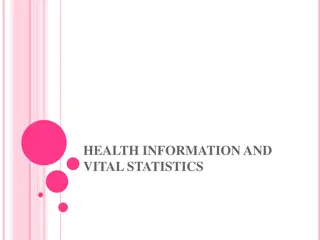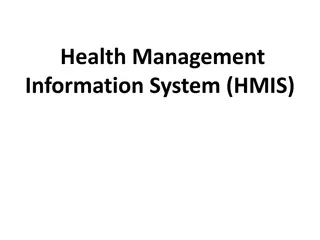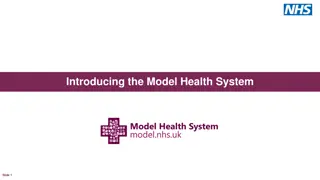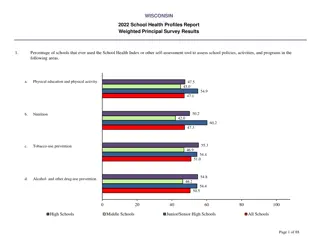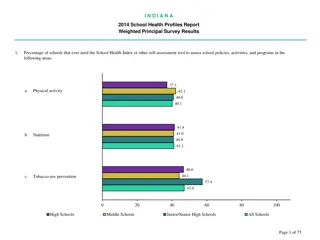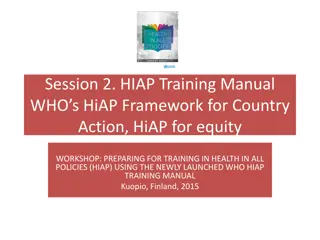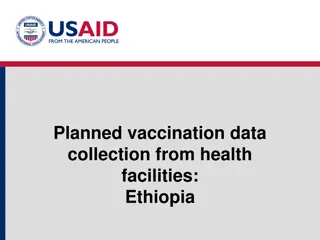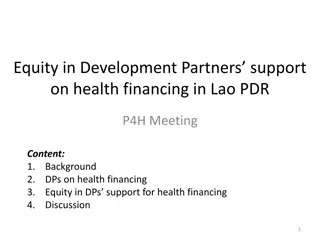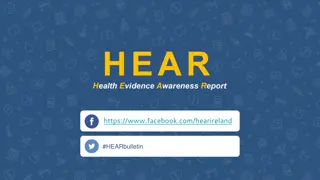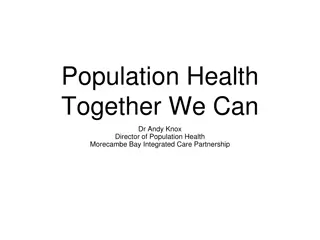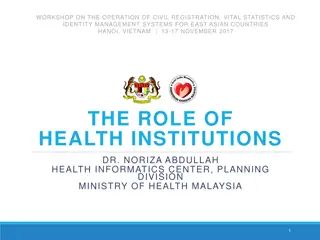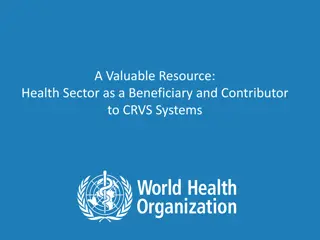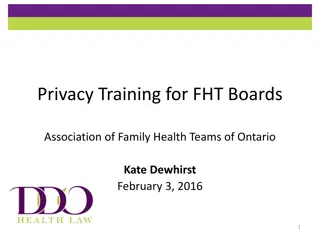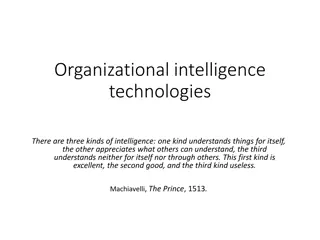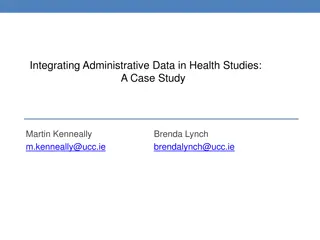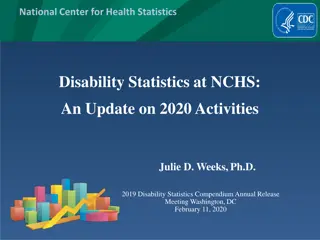A Student Exploration of the Global Impacts of Climate Change on Human Health
This research delves into the effects of climate change on human health, covering how a warming climate, changes in precipitation, and increased flooding frequencies impact various health aspects such as infectious diseases, nutrition, and mental health. The study provides a visual model illustratin
5 views • 17 slides
Understanding One Health: An Interdisciplinary Approach to Integrated Health
One Health is an integrated approach that emphasizes the interconnectedness of human, animal, and environmental health. This holistic perspective acknowledges the interdependence of these systems and aims to achieve sustainable balance for the well-being of all. By critically engaging with One Healt
0 views • 60 slides
Overview of Distributed Systems: Characteristics, Classification, Computation, Communication, and Fault Models
Characterizing Distributed Systems: Multiple autonomous computers with CPUs, memory, storage, and I/O paths, interconnected geographically, shared state, global invariants. Classifying Distributed Systems: Based on synchrony, communication medium, fault models like crash and Byzantine failures. Comp
9 views • 126 slides
Partnership between Low and Low-medium income countries to boost health. systems
This presentation highlights the common challenges faced by low and low-medium income countries in boosting their health systems, such as political instability, lack of funding, and unstructured healthcare systems. It emphasizes the importance of collaborative efforts between these countries to addr
6 views • 6 slides
Understanding Information Systems in Organizational Management
Management in organizations is divided into three levels: operational, tactical, and strategic. Each level requires different information systems to support various activities. Operational systems focus on routine transactions and control processes, while middle-level systems aid in semi-structured
9 views • 39 slides
Understanding Management Information Systems (MIS)
Management Information Systems (MIS) are vital for collecting, processing, and analyzing data in business activities. They assist decision makers, facilitate communication, and maintain records. Components include people, data, business procedures, hardware, and software. Various types of informatio
1 views • 11 slides
Understanding Health Disparities and Equity in Behavioral Health Care
This module explores the significance of health disparities, health equity, and social justice within integrated behavioral health care. It delves into the role of addressing disparities, promotes ways to achieve equity in care models, and discusses the key organizations dealing with health disparit
0 views • 28 slides
Understanding Different Types of Recommender Systems
Recommender systems play a crucial role in providing personalized recommendations to users. This article delves into various types of recommender systems including Collaborative Filtering, Content-Based, Knowledge-Based, and Group Recommender Systems. Collaborative Filtering involves making predicti
0 views • 7 slides
Understanding Vital Statistics and Health Information Management
Vital records encompass crucial life events such as births, deaths, and marriages, forming the basis of vital statistics. These statistics serve to quantify and analyze various aspects of health, including mortality, morbidity, and population dynamics. Health Information Systems play a pivotal role
1 views • 30 slides
Regional Framework for Action on Health and Climate Change
Regional Framework for Action on Health and Climate Change outlines pillars focusing on health protection from climate change through governance, policy, and engagement. It emphasizes building health systems resilience, multi-sectoral actions, and mobilizing support for public health responses. Pill
3 views • 6 slides
Introduction to Embedded Systems Design
Embedded Systems Design, Chapter 1 provides an insightful overview of embedded systems, distinguishing them from general-purpose computers. The chapter delves into the characteristics of embedded systems, their design considerations, and the various types of embedded computers such as general-purpos
1 views • 7 slides
Introduction to Computer Systems: Components, Types, and Functions
This session conducted by Dr. Ebenezer Ankrah covers the essential aspects of computer systems, including hardware components, types of computer systems, and information systems. Students will gain an understanding of the fundamental principles and characteristics of computer systems, enabling them
0 views • 41 slides
Understanding Mental Health in Tower Hamlets: Key Stats and Strategies
The Tower Hamlets JSNA report for February 2019 sheds light on the prevalence of mental health issues in the borough, highlighting statistics such as higher rates of mental health disorders compared to London. It emphasizes the importance of addressing wider determinants of mental health and the nee
1 views • 52 slides
Understanding Health Disparities and Medicaid's Role in Advancing Equity
Health and health care disparities refer to differences in health outcomes and access to care among different groups, often linked to social, economic, and environmental inequities. People of color face longstanding disparities in health and health care, with factors inside and outside the health ca
5 views • 16 slides
New Faculty Workshop Series: Student Health and Wellness Connection is Prevention
The New Faculty Workshop Series on Wednesday, September 15, 2021, focuses on student health and wellness, emphasizing prevention at the University of Connecticut. Featuring speakers Suzanne Onorato, Executive Director of Student Health and Wellness (SHaW), and Kristina Stevens, Director of SHaW Ment
0 views • 24 slides
Overview of Health Management Information System (HMIS)
Health Management Information System (HMIS) is a web-based system established by the Ministry of Health and Family Welfare (MOHFW) in 2008. It allows for monitoring performance, quality of healthcare services, evidence-based planning, and monitoring. HMIS captures various data related to service del
1 views • 39 slides
Enhancing Healthcare Systems Through Data-Driven Improvement
The Model Health System offers data-driven insights to enhance patient outcomes and population health by identifying opportunities for improvement across care quality, productivity, and organizational culture. Through benchmarking and clinical improvement data, it supports systems in achieving bette
0 views • 15 slides
Wisconsin 2022 School Health Profiles Report
The Wisconsin 2022 School Health Profiles Report provides insights from a weighted principal survey on various aspects of school health programs. Results include the percentage of schools using self-assessment tools, engaging in wellness policy activities, and overseeing health programs. The data hi
0 views • 88 slides
Indiana 2014 School Health Profiles Report
The Indiana 2014 School Health Profiles Report provides insights on the percentage of schools using self-assessment tools for assessing various health areas, inclusion of health-related objectives in school improvement plans, reviewing health and safety data in improvement planning, and oversight of
0 views • 75 slides
WHO's HiAP Framework and Global Mandates for Health Equity
This content discusses the HiAP Framework for Country Action and Global Mandates for promoting health equity. It covers resolutions, declarations, and recommendations by various organizations to address social determinants of health and reduce health inequities. The WHO Director-General is urged to
0 views • 11 slides
Vaccination Data Collection and Health Care System in Ethiopia
Planned vaccination data collection is underway in health facilities in Ethiopia, with teams visiting Enumeration Areas and health centers to ensure children are vaccinated. The health care system in Ethiopia includes Health Centers at regional, zonal, and woreda levels, staffed with health officers
0 views • 9 slides
Health Inequalities in Jordan: Social Determinants and Priorities
This study by Dr. Hoda Rashad in Jordan explores health inequalities and their social determinants, analyzing 85 health indicators in various categories like child health, non-communicable diseases, reproductive health, and health system performance. Key findings reveal progress in child mortality,
0 views • 24 slides
Enhancing RH Commodity Security: Ghana MoH Perspective
Ghana's Ministry of Health (MoH) emphasizes country ownership in addressing the multi-sectoral challenges of reproductive health (RH) commodity security. The MoH highlights the importance of stakeholder involvement in national planning, coordination mechanisms, and strategic frameworks to improve ma
0 views • 18 slides
Equity in Development Partners Support on Health Financing in Lao PDR P4H Meeting
The meeting focuses on addressing health indicators, inequities, and health financing challenges in Lao PDR. It analyzes the background of health indicators, inequities by socio-economic status and ethnic groups, and the current health financing situation in the country. The discussion delves into s
0 views • 23 slides
Collaborative Efforts of Irish Health Librarians in Providing Evidence-Based Practice Support
Current awareness newsletter freely available on the internet, providing high-quality, relevant information to healthcare professionals and consumers. This collaboration of Irish health librarians aims to promote evidence-based practice by offering up-to-date information and resources. The conscient
0 views • 12 slides
Public Health Challenges and Solutions in Morecambe Bay Integrated Care Partnership
Dr. Andy Knox, Director of Population Health at Morecambe Bay Integrated Care Partnership, addresses pressing issues such as major health inequalities, a North/South health divide, mental health crisis, obesity epidemic, and rising poverty rates. Various experts provide insights and solutions to tac
0 views • 15 slides
Information Systems in Organizations: Overview and Implementation
Information systems play a crucial role in organizations, encompassing transaction processing systems, functional area information systems, and enterprise resource planning systems. This content delves into the purpose of transaction processing systems, the support provided by information systems ac
0 views • 30 slides
Understanding Annual Health Checks for People with Learning Disabilities
Annual Health Checks (AHC) are essential for individuals over 14 years old with learning disabilities to review their physical and mental health. Conducted by GPs or health professionals, these checks help in detecting, treating, and preventing new health conditions. By being on the learning disabil
0 views • 8 slides
Global Fund's Strategic Framework 2017-2022: Investing in RMNCAH
The Global Fund's Strategic Framework 2017-2022 emphasizes investing to end epidemics like HIV, TB, and malaria, while building resilient health systems and promoting human rights and gender equality. The focus is on strengthening health systems, supporting community responses, and advancing reprodu
0 views • 6 slides
Understanding Health Education and Promotion Concepts
Health education is the process through which individuals and groups learn to promote, maintain, and restore health while addressing risks and preventing diseases and injuries. Health promotion involves planned actions to improve living conditions conducive to health, empower individuals, and create
0 views • 29 slides
Workshop on Civil Registration and Vital Statistics in East Asian Countries
The workshop in Hanoi, Vietnam focused on the operation of civil registration, vital statistics, and identity management systems for East Asian countries. Dr. Noriza Abdullah from the Health Informatics Center in Malaysia highlighted the role of health institutions in CRVS, emphasizing the importanc
0 views • 12 slides
The Role of Health Sector in CRVS Systems
The health sector serves as both a beneficiary and contributor to Civil Registration and Vital Statistics (CRVS) systems, playing a crucial role in informing health policies and priorities, understanding demographic trends, and monitoring health outcomes. CRVS data is vital for setting strategic age
0 views • 20 slides
Privacy Training for FHT Boards - Health Information Custodians in Ontario
This training material highlights the role of Health Information Custodians (HICs) in Family Health Teams (FHTs) and Family Health Organizations (FHOs) in Ontario under the Personal Health Information Protection Act (PHIPA). It explains the responsibilities of HICs, including protecting personal hea
0 views • 65 slides
Scottish Public Health Observatory: Enhancing Health Information for Better Decision Making
The Scottish Public Health Observatory collaborates with NHS National Services Scotland to provide health information, intelligence, and statistical services supporting NHS in enhancing quality improvement in health care. They analyze national health data to improve population health and reduce heal
0 views • 16 slides
Understanding Embedded Systems and Cyber-Physical Systems
Embedded systems are specialized computer systems embedded within larger systems, such as control systems and car controllers. This lecture covers real-time aspects, applications of Cyber-Physical Systems (CPS), and examples like the Boeing 777/Airbus A380 cockpit. It discusses the design process of
0 views • 22 slides
Understanding Organizational Intelligence Technologies
Organizational intelligence technologies involve three kinds of intelligence - understanding independently, appreciating what others can understand, and understanding neither for itself nor through others. This concept emphasizes the importance of collecting, storing, processing, and interpreting da
0 views • 47 slides
Health Education for Social Change: A Strategy for Public Health Development in Nigeria
The practice of health education in Nigeria dates back to the 1950s, playing a crucial role in promoting health and well-being. Health education provides vital information to the populace, empowering individuals to make informed decisions for better health outcomes. It covers a wide range of topics,
0 views • 12 slides
Integrating Administrative Data in Health Studies: A Case Study
This case study explores the integration of administrative data in health studies focusing on profiling the health status of Irish regions in 2010. The objectives include linking regional health profiles to prescribing patterns, incorporating demographics and drug scheme coverage rates, and simulati
0 views • 17 slides
EU4Health Programme: Transforming Public Health in Europe
The EU's financial strategy and priorities in the health domain are highlighted through the EU4Health programme, aiming to enhance public health in Europe. The HaDEA is actively involved in improving health in the Union, protecting against cross-border health threats, ensuring availability of afford
0 views • 11 slides
Overview of National Center for Health Statistics Activities
The National Center for Health Statistics (NCHS) is the nation's principal health statistics agency, responsible for collecting, analyzing, and disseminating nationally representative health data. NCHS is part of 13 designated Federal Statistical Agencies and operates various data systems such as th
0 views • 20 slides








